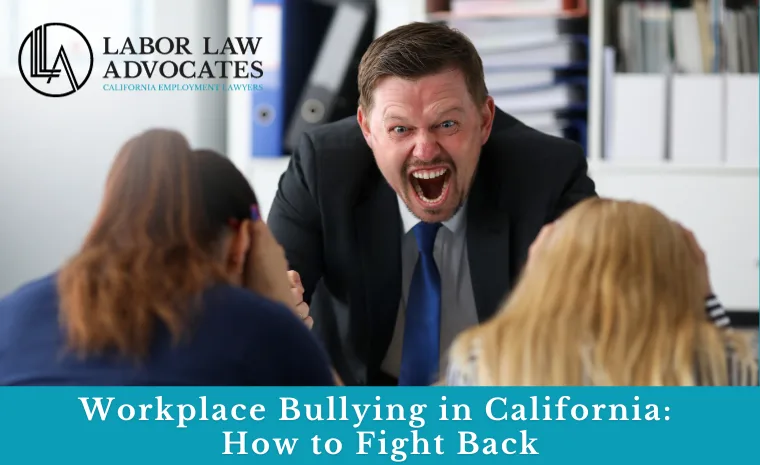Workplace Bullying in California: How to Fight Back
In the diverse landscape of California’s labor market, employees contribute their skills and talents to drive innovation and growth. Our state’s bustling workplaces should ideally be fertile ground for professional development and personal fulfillment, but beneath the sunshine and prosperity, a deceitful issue becomes more pressing each day: the problem of workplace bullying.
For countless individuals across California, the concept of workplace bullying is far from unknown. Hostile work environments can manifest various bad behaviors, ranging from verbal abuse and intimidation to psychological harassment, creating detrimental experiences that not only affect an employee’s well-being but can also undermine their career progression, job satisfaction, mental health, and overall quality of life.
As labor attorneys committed to advocating for workers’ rights and dignity, we understand the gravity of the situation for victims of bullying. In today’s blog, we aim to shed some light on the prevalence of workplace bullying in California, offering insight, guidance, and actionable steps to help employees combat this sadly common problem.
In particular, we will explore:
- The definition of workplace bullying
- Differences between workplace bullying and workplace harassment
- Legal options for a victim of workplace bullying
- How to fight back against workplace bullying in California
Experimenting harassment at your workplace? You are not alone.
The Definition Of Workplace Bullying
Workplace bullying is a persistent pattern of mistreatment or harmful behavior directed at an employee or group of employees within a professional setting, often creating a hostile work environment. It typically involves actions or words that are intended to intimidate, belittle, or undermine the target, creating a hostile and intimidating work environment.
This behavior can take various forms, such as verbal abuse, ridicule, humiliation, exclusion, or the unjustified assignment of tasks, and it often occurs over an extended period, in the worst cases leading to full-blown worker intimidation.
Of course, workplace bullying can have detrimental effects on the well-being, mental health, and job performance of the targeted individuals, and it’s a form of workplace harassment that may not necessarily be based on characteristics protected by anti-discrimination laws, making it a complex issue to address. Legal definitions and remedies for victims of bullying in the workplace can vary by jurisdiction or state, but it is generally recognized as a harmful and unethical practice that employers in California should take steps to prevent and address.

Differences Between Workplace Bullying and Workplace Harassment
Workplace bullying and workplace harassment are related concepts, but they have some important distinctions that employees should be aware of in order to effectively fight them back effectively. These are:
Nature of the Behavior
- Workplace Bullying: Workplace bullying typically involves repeated, persistent, and aggressive behavior, if not downright workplace violence, aimed at an individual or group of individuals. It often includes actions that are intended to belittle, intimidate, or undermine the target, creating a hostile environment. Bullying can manifest through verbal abuse, exclusion, and humiliation, among other tactics.
- Workplace Harassment: Workplace harassment encompasses a broader range of behaviors, which can be based on various protected characteristics such as race, gender, sexual orientation, religion, age, or disability. Certain situations, like sexual harassment, include unwelcome conducts, comments, or actions that create a hostile or intimidating work environment based on these protected characteristics.
Motivation
- Workplace Bullying: Bullying may not necessarily be tied to specific protected characteristics and can sometimes be driven by personal conflicts, power imbalances, or a general desire to control or undermine others.
- Workplace Harassment: Harassment is typically motivated by the victim’s membership in a protected class and seeks to discriminate against or mistreat them based on these characteristics.
Legal Protections
- Workplace Bullying: While workplace bullying is harmful and unethical, it may not always fall under specific legal protections in all jurisdictions. Laws that address bullying directly are less common, and addressing it may require relying on more general workplace safety and anti-discrimination laws.
- Workplace Harassment: Workplace harassment is often covered by anti-discrimination and anti-harassment laws, which provide legal protections for individuals who experience harassment based on their protected characteristics. Victims of harassment may have clearer legal avenues to seek justice.
It’s important to note that the lines between bullying and harassment can sometimes blur, and in practice, what is labeled as bullying may also involve elements of harassment, particularly if the bullying behavior is motivated by discriminatory factors (age, gender or race, among others).
However, both workplace bullying and workplace harassment are detrimental to an employee’s physical and mental health, and the work environment, and all employers should take steps to prevent and address both issues to ensure a healthy and respectful workplace.
Legal Options For A Victim Of Workplace Bullying
California does not have a specific state law that defines workplace bullying or provides a comprehensive legal framework to address it. Instead, workplace bullying in California is often addressed through existing laws that regulate harassment, discrimination, workplace safety, and related employment issues. These laws include:
- California Fair Employment and Housing Act (FEHA): The FEHA is a state law that prohibits discrimination, harassment, and retaliation based on protected characteristics such as race, sex, religion, age, disability, and more. While FEHA primarily addresses harassment and discrimination, instances of bullying based on these characteristics could fall under its authority.
- California Occupational Safety and Health Act (Cal/OSHA): Cal/OSHA sets workplace safety standards in the state, and employers are required to provide a safe and healthful work environment. This could encompass protection against safety risks associated with bullying if it results in a hazardous work environment.
- Whistleblower Protection Laws: California has laws protecting employees who report unlawful or unsafe workplace practices. If workplace bullying leads to unethical or illegal conduct, employees may be protected under these laws if they report it.
- Common Law Claims: In some cases, employees may pursue non-labor common law claims, such as intentional infliction of emotional distress or negligence, against individuals or employers who engage in or tolerate workplace bullying.
For the most up-to-date and accurate information on workplace bullying in California, it’s advisable to consult with an experienced labor attorney to review the latest state labor laws and regulations. Additionally, workplace policies and procedures implemented by individual employers may offer protections and mechanisms for addressing workplace bullying within their organizations, so go to HR to report any offending behavior as a first step.
Don’t let your workplace become a nightmare.
How To Fight Back Against Workplace Bullying In California
If you experience workplace bullying, emotional abuse or a hostile work environment, there are several legal and practical steps, like the Whistleblower Protection Act, that may help you address the situation and protect your rights:
Document the Bullying
Keep detailed records of incidents, including dates, times, locations, individuals involved, and descriptions of what occurred. This documentation will be valuable in any future legal proceedings.
Review the Company Policies
Familiarize yourself with your company’s policies on harassment, discrimination, and workplace conduct. Follow any established procedures for reporting workplace bullying, which may involve speaking to a supervisor, manager, or HR department.
Speak with a Supervisor or HR
If you feel safe doing so, have a conversation with someone higher in the chain of command, like your supervisor, manager, or the Human Resources department to inform them about the bullying. Describe the situation, provide evidence if possible, and request their intervention to address the issue.
Use Whistleblower Protections
If the bullying started after bringing up a sensitive workplace issue, and involves unlawful or unsafe behavior, consider whether it falls under the California Whistleblower Protection Act. Reporting illegal conduct may offer you legal protections from the offending person(s).
Consult an Attorney
If the bullying continues or escalates and your employer is unresponsive or complicit, consult with an employment attorney who specializes in workplace harassment and discrimination cases. They will help you understand your legal rights and options for any legal action.
File a Complaint with a Government Agency
In California, you can file a complaint with the California Department of Fair Employment and Housing (DFEH) if you believe the bullying is based on a protected characteristic covered by the Fair Employment and Housing Act (FEHA). DFEH investigates claims of harassment and discrimination in the workplace.
Consider Legal Action
If other avenues do not lead to resolution, you may want to explore legal action, such as filing a lawsuit against the employer for failing to address the bullying or for any associated damages. Your labor attorney will be invaluable in these cases.
Retain Evidence
Maintain all evidence related to the bullying, including emails, text messages, and any written or digital communication that supports your case. You may want to keep copies of these in devices outside of your workplace, to avoid any unwanted access or tampering.
Seek Emotional Support
Workplace bullying can take a toll on your mental and emotional well-being. Consider seeking counseling or therapy to cope with the stress levels and emotional abuse of the situation. Your labor attorney might offer options for these services.
Laws and regulations regarding workplace bullying may vary by jurisdiction, so it’s essential to consult with an attorney who specializes in employment law in your area to understand the specific legal protections available to you. Remember, you can always fight back against workplace bullying, you just need the perfect support behind you.
Get Help From An Award-Winning Employment Attorney
If you are experiencing repeated instances of workplace bullying, emotional abuse or high stress levels, and you have already exhausted all possible resolution venues, getting in touch with an experienced employment attorney for advice will always be the best course of action.
A skilled lawyer can provide guidance and advice on your legal rights, help you document the issues, assess the strength of your case, and even put you in contact with mental health professionals for your recovery. Labor Law Advocates has award-winning employment law attorneys ready to help you fight for your rights against workplace bullying and harassment, and represent you in civil actions if necessary. Increase your chances of a successful outcome and obtain the compensation and justice you deserve. Call us today at (424) 688 3632 for a FREE, no-obligation consultation.




